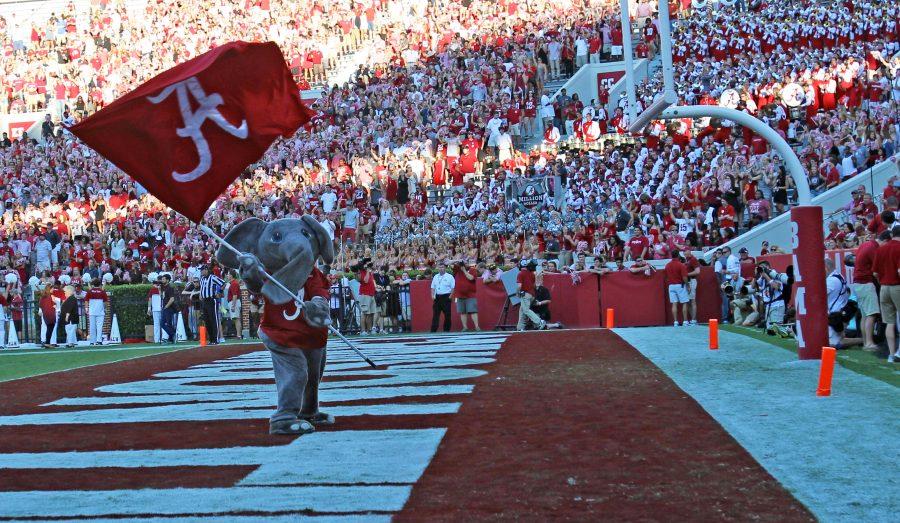History is repeating itself at the University of Alabama.
With the debate over whether or not Dixieland Delight should be banned from Bryant Denny Stadium still up in the air, Alabama professor Meredith Cummings remembers when she was a student at Alabama from 1990 to 1995, including her masters, and the University prohibited the band from playing Rammer Jammer.
“When I first heard about the Dixieland Delight issue, I immediately thought about the years that Rammer Jammer had been banned off and on again,” Cummings said. “It was gone in the 80s, then it was gone in the 90s.”
Alabama first cheered Rammer Jammer in 1980. However, former Alabama athletic director Steve Sloan banned it in the late 1980s because it was considered unsportsmanlike.
Rammer Jammer came back, however, until 1994 when the NCAA got involved in sportsmanship during football games.
“What happened was the NCAA issued this report in 1994 and it called for a crack down on fighting and taunting and offensive language,” Cummings said. “It was just a report. So that came out of the 1993 football season, which was filled with brawls and fighting on the field with various teams here and there.”
For Alabama, Cummings said the athletic director at the time, Cecil “Hootie” Ingram, pulled the plug on Rammer Jammer before the 1994 football season started because the NCAA considered it a taunt.
“We were upset because it was right when were winning and doing really well that they took Rammer Jammer away,” Cummings said. “I mean everybody knows that’s the best part. It’s so much fun at the end of a game. To not have that was very difficult.”
Alabama had just won its 12th Nation Championship title in 1992.
Rammer Jammer returned in 1996 when then-athletics director Bob Bockrath lifted the ban. In 2003, there was a compromise that still is around today: the band is only allowed to play the cheer’s music after a Crimson Tide victory.
But now Alabama is back to where it once was, just with a different song: Dixieland Delight.
During the 2014 Iron Bowl, the student section took the song to a whole new level. Instead of only singing an expletive directed at Auburn University after one verse, it sung after every verse. Since then, there’s been debate as to whether or not the University should ban the song in its entirety from Bryant Denny.
There are many legal things to be considered since the first amendment includes freedom of speech.
Professor Clay Calvert at the University of Florida wrote a law review article title “Fans and the First Amendment: Cheering and Jeering in College Sports.”
Calvert said that the University is allowed to establish rules that set the boundaries of free speech in a public forum like a football stadium. It can also enforce these rules.
“The real problem arises when a public university tries to enforce a rule against ‘offensive’ speech,” Calvert said. “The term ‘offensive’ is so vague that such a rule would [be] unconstitutional because it can be enforced unfairly. A university would need to clearly define what it means by ‘offensive’ to enforce such a rule.”
To some, the words added into Dixieland Delight may not be considered offensive. It’s a fine line to walk.
“There are some words better expressed in private, away from families and children,” Cummings said. “I have a child and I wouldn’t mind, but I’m not every parent. I think some words are clearly worse than others in a public setting.”
Alabama sophomore Natalie Garner grew up as an Alabama Crimson Tide fan, so Dixieland Delight is more than just a song to her it’s a tradition.
“Bleeding crimson isn’t just a saying, it’s my lifestyle,” she said. “It’s how I grew up.”
Garner’s brother Morgan Garner played for the Alabama football team from 2004 through 2008. He played for both Mike Shula and Nick Saban. She said she’s been to every home game and every bowl game since she was in third grade.
Garner’s known Dixieland Delight her whole life, but only learned the added-in verses in high school. Although she agrees that the level it was taken to during the Iron Bowl was a little much, the song shouldn’t be banned.
When it played Saturday during the fourth quarter against MTSU, a majority of the student section already left the game. While Garner’s friends left at half time, she stayed for all four quarters.
“I’ve grown up with the whole play for four, stay for four motto,” Garner said.
And Saturday, she was rewarded for doing so. When Dixieland Delight came over the speakers, she said she wanted to cry she was so excited. The girl next to her did cry.
She said the song boosted the morale of the student section and the stadium as a whole.
“Even the players, you could see them jumping up and getting hyped for the next play,” Garner said.
Entering this weekend’s game, it remains to see if Dixieland Delight will be cemented into a lasting Alabama tradition, or only a passing phase.









